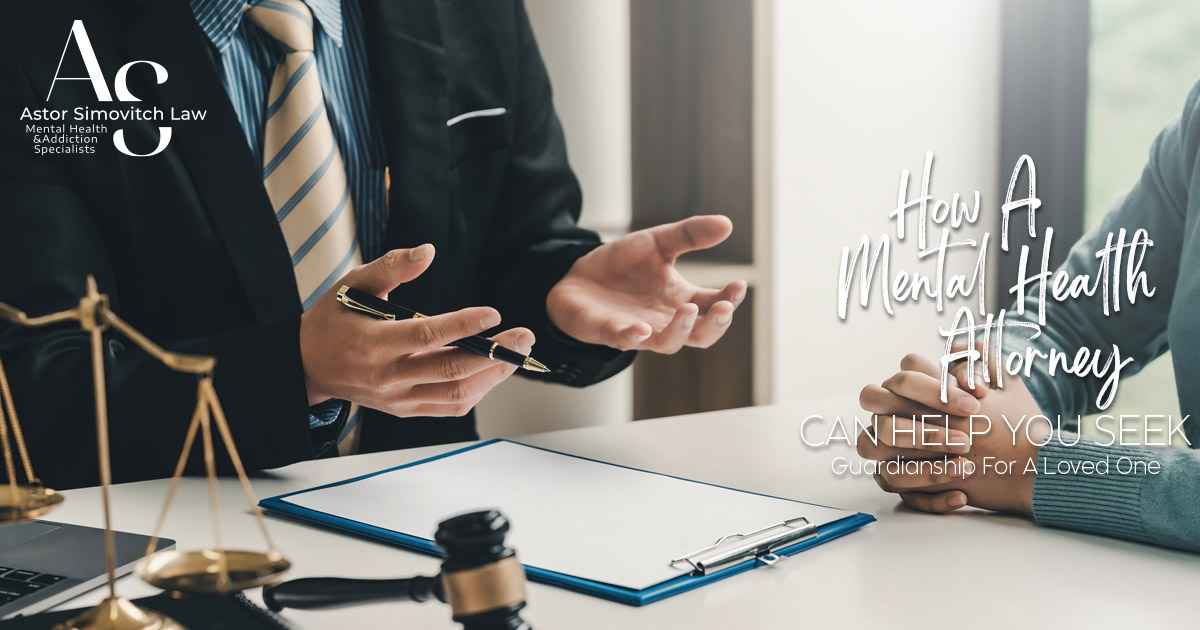How A Mental Health Attorney Can Help You Seek Guardianship For A Loved One

With appropriate psychological support and the help of medication, many Americans who experience mental health conditions can go about their daily lives without issue. However, in some cases, mental illness can severely impact a person’s ability to perceive reality, exercise self-control, and make sound decisions.
If someone you love is displaying signs of psychosis or mania, or has threatened to harm themselves, a mental health attorney can help you determine what steps to take to protect your loved one. This may include obtaining a guardianship order, which will give you the power to make decisions on your loved one’s behalf until they have recovered from their illness.

What Is Guardianship?
Florida law recognizes guardianship as a special legal relationship in terms of which one person (the guardian) is placed in charge of another person’s personal, financial, medical, and legal affairs (the ward). Guardianship arrangements are designed to ensure that the ward’s well-being is protected in circumstances where they are no longer of sound mind and are unable to look after themselves or make decisions in their own best interests. Because guardianship involves a significant limitation of the ward’s rights, there are strict legal requirements that must be met before a guardianship appointment can be made. Typically, family members who are seeking to establish guardianship over loved ones will appoint a mental health attorney to help them prepare their case and ensure they comply with the obligations of guardianship.
What Is The Difference Between Guardianship, The Marchman Act, And The Baker Act?
In Florida, there is a range of legal interventions available to assist those who are struggling with mental illness and/or substance abuse. Members of the public often find it challenging to understand the differences between these various legal mechanisms. In addition to guardianship, two legal interventions may be applicable in mental health cases: a Baker Act hold and Marchman Act proceedings. In a nutshell, a Baker Act hold allows certain legally authorized persons (doctors, judges, and law enforcement)to determine that an individual suffering from an acute mental health crisis, who is likely to harm themselves or others if not immediately assessed and stabilized, be taken to a facility for psychiatric evaluation. A Baker Act hold is essentially an emergency measure, and ideally should not be used to facilitate long-term treatment.
In contrast, the Marchman Act is Florida’s primary law for supporting those suffering from substance use disorders. In essence, it caters to situations in which a person has lost the power of self-control in relation to their substance abuse, and they are unable to recognize they need treatment or have outright refused treatment, yet are at real risk of harming themselves or others without it. In these circumstances, a concerned individual or family member can bring a Marchman Act petition to have their loved one involuntarily placed in a facility to receive treatment for their substance use. Though they are sometimes used in combination, guardianship and the Marchman Act are very different.

Guardianship: A Tailor-Made Solution
One of the major advantages of guardianship is that, unlike the Marchman Act and Baker Act, it does not require a one-size-fits-all approach. There are several different types of guardianship in Florida law, and with the help of an experienced mental health attorney, you can establish a guardianship arrangement that is tailored to your loved one’s needs.
Limited vs plenary guardianship
Not all guardianships are the same. In each case, the court may tailor its order to grant the guardian authority over only those decisions that the ward can no longer take for themselves. Some guardianships only relate to a person’s financial affairs, but not their personal affairs (such as where they reside, what medical treatment they receive, who they associate with). Guardianships that authorize the guardian to make certain limited decisions in respect of their wards are called ‘limited’ guardianships. Those that give the guardian general powers over their ward’s affairs – that is, they are authorized to make any decision that the ward previously would have been able to make for themselves – are called ‘plenary’ guardianships. Guardianships are intended to help you protect, rather than control, your loved one, so ideally, a guardianship arrangement should strive to protect their independence where possible.
Emergency vs permanent guardianship
Your loved one may be experiencing a particularly challenging period in life, but this doesn’t mean that they’ll need a guardian over the long term. Emergency temporary guardianship is commonly used in conjunction with a Marchman Act order to facilitate someone’s entry into substance abuse treatment and ensure that their personal and financial affairs are in safe hands while they recover from their period of mental illness. For example, if a person has a degenerative neurological condition or has suffered a traumatic brain injury, they will likely need a guardian for the rest of their lives.
Signs That Your Loved One May Need A Guardian
You should only seek appointment as a guardian after careful consideration of your loved one’s circumstances. Consulting with an experienced mental health attorney can help you decide if guardianship is the right legal intervention at this time. If your family member is exhibiting any of the following behaviors or symptoms, guardianship may be necessary:
- They have had to be hospitalized for psychiatric care on multiple occasions or are having recurrent delusional or psychotic episodes;
- They are refusing to take their medication or undergo psychiatric treatment;
- They are unable to look after themselves and meet basic hygiene and dietary needs, and/or are entirely unable to manage their finances;
- They are threatening to harm themselves or those around them.
Speaking to someone with experience in facilitating guardianship appointments will give you peace of mind that you are making the best decision for your loved one. Deciding to apply to become a court-appointed guardian is also a big decision, since guardians are subject to many special legal duties and must be prepared to take on a lot of responsibility.
A Mental Health Attorney Can Help You Protect Your Loved One’s Best Interests
Coming to terms with the fact that someone you love can no longer care for themselves can be incredibly difficult. For a compassionate mental health attorney who has years of experience under her belt and understands the emotional complexities of seeking a guardianship appointment, look no further than Astor Simovitch Law. Our dedicated guardianship lawyer, Audra Simovitch, will guide you through each step of the process and help you to achieve peace of mind that your loved one’s well-being is being protected.
Contact us today at 561-419-6095 to schedule a consultation or find out more about our services.